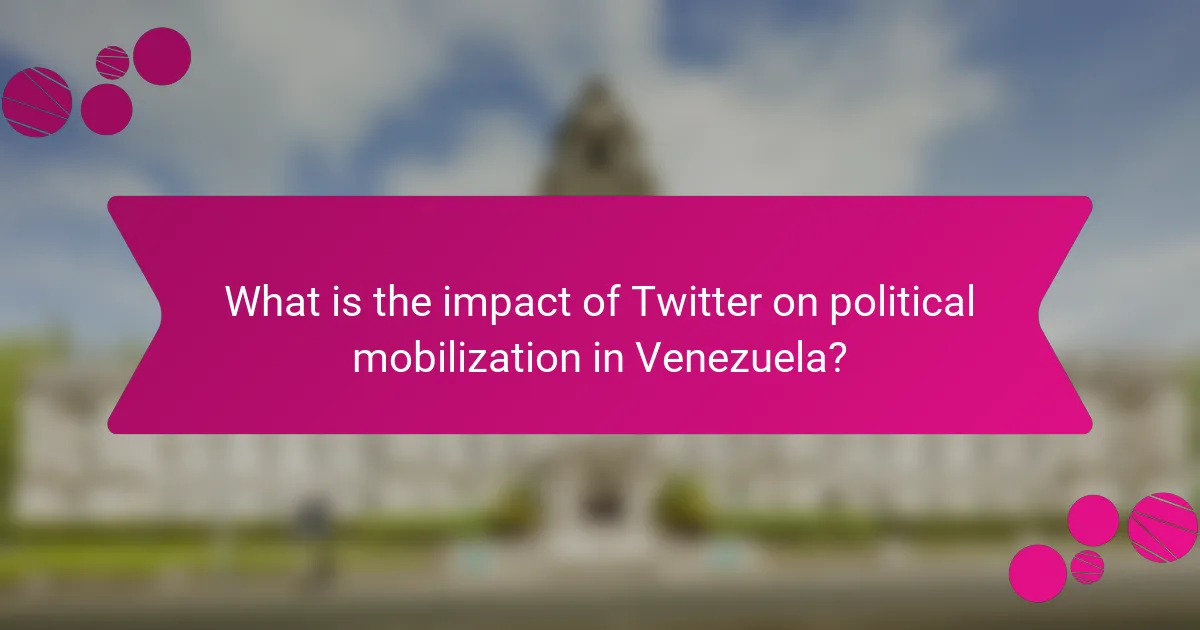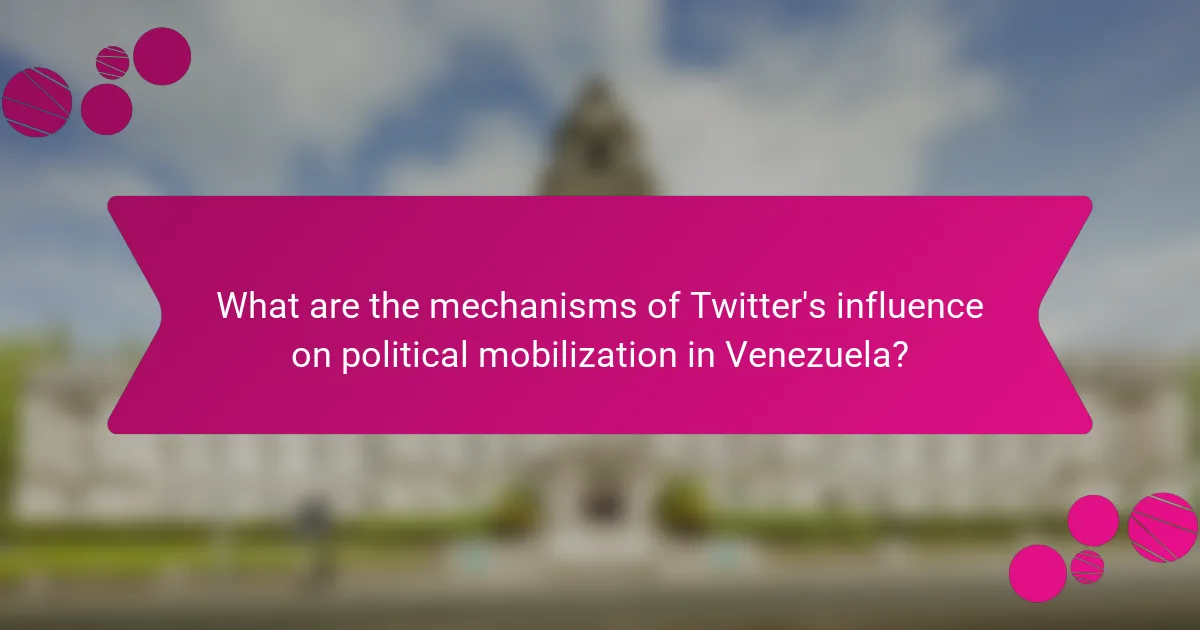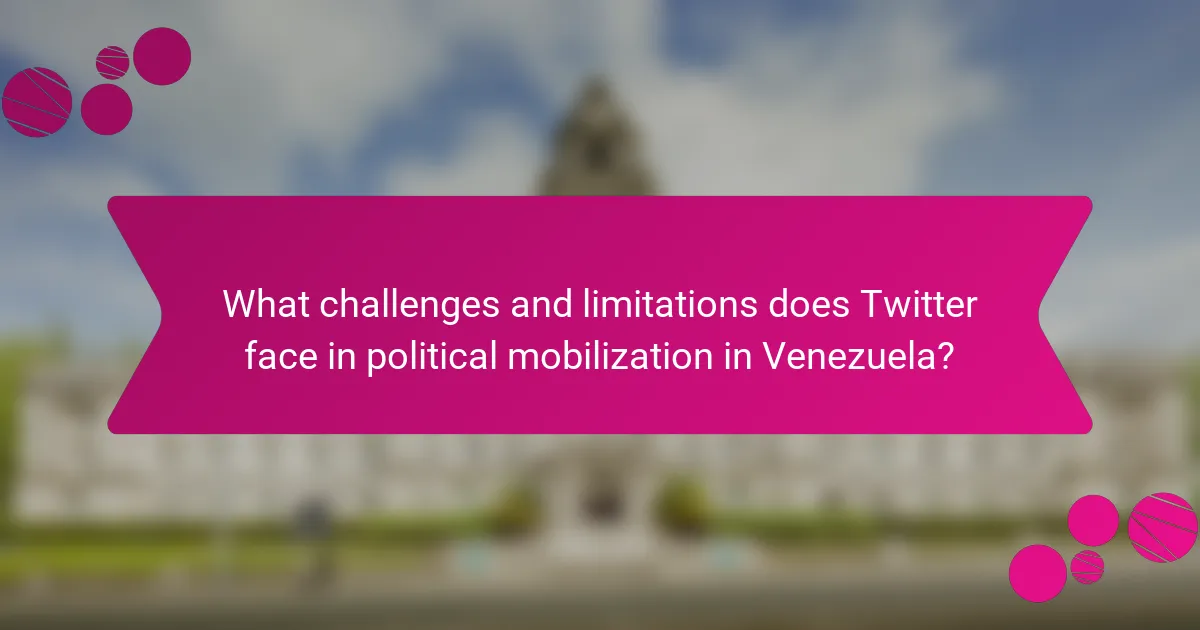
What is the impact of Twitter on political mobilization in Venezuela?
Twitter significantly impacts political mobilization in Venezuela. It serves as a platform for disseminating information and organizing protests. Activists use Twitter to coordinate events and share updates in real time. During the 2014 protests, Twitter was crucial in mobilizing crowds against the government. Studies show that social media, including Twitter, increases political engagement among users. In Venezuela, the government has attempted to control online narratives, yet Twitter remains a vital tool for opposition movements. The platform allows for rapid communication, bypassing state-controlled media. As of 2020, over 7 million Venezuelans were active on Twitter, showcasing its reach and influence in political discourse.
How has Twitter influenced political discourse in Venezuela?
Twitter has significantly influenced political discourse in Venezuela by providing a platform for real-time communication. It enables users to share information quickly, bypassing traditional media channels. This immediacy has allowed citizens to mobilize during protests and political events. For instance, during the 2014 protests, Twitter was instrumental in organizing demonstrations. It also facilitated the dissemination of opposition viewpoints against the government. The platform has been used to raise awareness about human rights abuses. Additionally, Twitter allows for the rapid spread of news and updates, shaping public opinion. Studies show that social media engagement correlates with increased political participation in Venezuela. Overall, Twitter has transformed the landscape of political dialogue in the country.
What role does Twitter play in shaping public opinion in Venezuela?
Twitter serves as a critical platform for shaping public opinion in Venezuela. It facilitates real-time communication and information dissemination among users. Venezuelans utilize Twitter to share news, express dissent, and mobilize during political unrest. The platform has been instrumental in organizing protests and amplifying opposition voices. According to a study by the University of California, Twitter usage increased significantly during the 2014 protests. This surge in activity highlighted the platform’s role in fostering political engagement. Furthermore, Twitter enables users to bypass traditional media, which often faces government censorship. This allows for a more diverse range of opinions to be shared and discussed. Overall, Twitter significantly influences public perception and political dialogue in Venezuela.
How do Venezuelan politicians utilize Twitter for communication?
Venezuelan politicians utilize Twitter as a strategic communication tool. They engage directly with citizens to share updates and policies. Twitter serves as a platform for real-time interaction during political events. Politicians often use hashtags to amplify their messages and mobilize supporters. They also respond to public inquiries and criticisms through tweets. This platform allows for rapid dissemination of information, especially during crises. Studies indicate that Twitter has shaped public opinion and political discourse in Venezuela. Data shows increased engagement and follower counts correlate with political events.
Why is Twitter significant in the context of Venezuelan politics?
Twitter is significant in the context of Venezuelan politics because it serves as a key platform for political communication and mobilization. The Venezuelan government has restricted traditional media, limiting freedom of expression. As a result, Twitter has emerged as an alternative source of information and a space for political discourse. It enables citizens to share real-time updates and organize protests. The platform has facilitated the dissemination of information during political crises, such as the 2014 protests against the government. Studies show that Twitter usage correlates with increased political engagement among Venezuelans. Furthermore, it allows for international visibility of local issues, garnering global support for political movements.
What are the historical events that highlight Twitter’s role in political mobilization?
Twitter played a significant role in political mobilization during key events in Venezuela’s history. The 2007 student protests against the closure of RCTV showcased Twitter’s capacity to organize and disseminate information rapidly. In 2014, the “La Salida” protests utilized Twitter to coordinate demonstrations against the Maduro government, leading to widespread mobilization. The 2017 protests against the Constituent Assembly also saw Twitter as a crucial tool for organizing and sharing real-time updates. During these events, hashtags like #SOSVenezuela trended globally, amplifying the voices of protesters. These instances demonstrate Twitter’s effectiveness in facilitating communication and mobilization among Venezuelans during times of political unrest.
How does Twitter compare to traditional media in Venezuela?
Twitter serves as a crucial platform for communication and political mobilization in Venezuela, contrasting sharply with traditional media. Traditional media in Venezuela is often state-controlled, limiting access to unbiased information. In contrast, Twitter allows users to share real-time updates and opinions freely. The platform has become a space for political discourse, enabling citizens to organize protests and share news that may be censored elsewhere. For example, during the 2014 protests, Twitter was instrumental in coordinating demonstrations and disseminating information. This illustrates how Twitter empowers Venezuelans to bypass traditional media restrictions, fostering a more participatory political environment.

What are the mechanisms of Twitter’s influence on political mobilization in Venezuela?
Twitter influences political mobilization in Venezuela through rapid information dissemination, grassroots organization, and engagement of political discourse. The platform allows users to share real-time updates during protests and political events. This immediacy fosters a sense of urgency and encourages participation. Additionally, Twitter enables the formation of networks among activists, facilitating coordination and mobilization efforts. Hashtags serve as tools for rallying support and increasing visibility for political causes. Studies show that Twitter usage correlates with increased political engagement among Venezuelans. For instance, during protests in 2014, Twitter was pivotal in organizing and amplifying voices against the government.
How does Twitter facilitate grassroots movements in Venezuela?
Twitter facilitates grassroots movements in Venezuela by providing a platform for real-time communication and organization. It allows users to share information quickly, mobilizing support for protests and initiatives. The platform’s hashtag feature enables users to aggregate conversations around specific topics, increasing visibility. Venezuelans utilize Twitter to document human rights abuses, raising awareness both locally and internationally. Studies show that during protests, Twitter significantly amplifies messages, reaching wider audiences. In 2017, for example, tweets related to anti-government protests surged, demonstrating its role in mobilization. The platform also fosters community building among activists, creating networks for collaboration.
What strategies do activists use on Twitter to mobilize support?
Activists use various strategies on Twitter to mobilize support. They create trending hashtags to raise awareness and unify their message. Engaging visuals, such as infographics and videos, enhance their reach and impact. Activists often share personal stories to humanize their cause and connect emotionally with followers. They utilize Twitter polls to encourage interaction and gauge public opinion. Collaborating with influencers amplifies their message to a broader audience. Live-tweeting events keeps followers informed in real-time and fosters a sense of community. By responding to followers and addressing concerns, activists build trust and loyalty. These strategies collectively increase visibility and support for their causes.
How does Twitter help in organizing protests and demonstrations?
Twitter facilitates the organization of protests and demonstrations by enabling rapid communication among users. It allows individuals to share information about events in real-time. Hashtags are commonly used to unify messages and increase visibility. This platform helps mobilize supporters quickly and efficiently. Users can disseminate critical updates and logistical details instantly. Additionally, Twitter serves as a space for coordination among activists. The platform’s public nature allows for broader engagement beyond local communities. Historical examples, such as the 2014 Venezuelan protests, illustrate Twitter’s role in rallying participants and amplifying voices.
In what ways does Twitter affect voter engagement in Venezuela?
Twitter affects voter engagement in Venezuela primarily by facilitating information dissemination and mobilizing citizens. The platform allows users to share news and updates about elections and political events rapidly. This immediacy encourages discussions among users, increasing awareness of voter issues.
Additionally, Twitter serves as a tool for political campaigns to reach potential voters directly. Candidates utilize the platform to communicate their messages and engage with the electorate. This direct interaction can enhance voter interest and participation.
Research indicates that social media, including Twitter, has played a significant role in recent Venezuelan elections. According to a study by the International Institute for Democracy and Electoral Assistance, social media has influenced voter turnout by providing critical information and fostering community engagement.
In summary, Twitter enhances voter engagement in Venezuela through rapid information sharing, direct candidate-voter communication, and fostering discussions around electoral issues.
What demographic groups are most active on Twitter regarding political issues?
Young adults, particularly those aged 18 to 29, are the most active demographic group on Twitter regarding political issues. This group frequently engages in discussions about political events and policies. Additionally, individuals with higher education levels are more likely to participate in political discourse on Twitter. Research indicates that urban residents also show increased activity on the platform concerning political matters. According to a Pew Research Center study, 66% of Twitter users aged 18 to 29 engage with political content. Furthermore, the platform sees significant engagement from individuals identifying as politically liberal.
How does Twitter impact voter turnout in Venezuelan elections?
Twitter significantly impacts voter turnout in Venezuelan elections by facilitating information dissemination and mobilizing citizens. The platform allows users to share news, campaign messages, and updates rapidly. This increased access to information can enhance political awareness among voters. Research indicates that social media usage correlates with higher electoral participation. A study by the University of California found that social media campaigns effectively engage younger voters, who are crucial in Venezuelan elections. Additionally, Twitter serves as a platform for organizing protests and political rallies, further encouraging voter engagement. These factors collectively contribute to increased voter turnout in Venezuela.

What challenges and limitations does Twitter face in political mobilization in Venezuela?
Twitter faces significant challenges in political mobilization in Venezuela. The government exerts heavy censorship on social media platforms. This limits the free flow of information and stifles dissent. Additionally, internet access is often unreliable or restricted, hindering user engagement. Many Venezuelans lack the necessary digital literacy to effectively utilize Twitter for mobilization. Furthermore, the platform’s algorithm can amplify misinformation, complicating the political landscape. The political environment is also marked by fear of repercussions for expressing dissenting views online. These factors collectively undermine Twitter’s effectiveness as a tool for political mobilization in Venezuela.
What are the risks associated with using Twitter for political activism in Venezuela?
Using Twitter for political activism in Venezuela poses significant risks. The Venezuelan government monitors social media activity closely. Activists face threats of arrest and persecution for their online expressions. A report by Human Rights Watch indicates that many activists have been detained for their tweets. Additionally, the risk of misinformation can undermine activism efforts. False narratives can spread rapidly, leading to confusion among supporters. Cybersecurity threats also exist, as government entities may hack accounts to gather information. Overall, the environment for political activism on Twitter in Venezuela is fraught with danger.
How do government restrictions affect Twitter’s role in mobilization?
Government restrictions significantly limit Twitter’s role in mobilization. These restrictions can include censorship, account suspensions, and internet shutdowns. For instance, during protests, the Venezuelan government has blocked access to Twitter. This action disrupts communication among activists and organizers. Consequently, it hampers the dissemination of information and mobilization efforts. Research shows that limited access to social media reduces public engagement in protests. A study by the International Journal of Communication highlights this effect in the Venezuelan context. Thus, government restrictions directly undermine Twitter’s effectiveness in political mobilization.
What are the implications of misinformation on Twitter for political movements?
Misinformation on Twitter significantly undermines political movements. It can distort public perception and influence voter behavior. Political movements often rely on accurate information to mobilize support. When misinformation spreads, it creates confusion and distrust among the populace. For instance, during the Venezuelan political crisis, false narratives circulated widely on social media. This led to misinformed opinions about key political events and figures. Research shows that misinformation can erode the credibility of legitimate sources. Consequently, political movements may struggle to gain traction when misinformation prevails.
How can activists effectively use Twitter for political mobilization in Venezuela?
Activists can effectively use Twitter for political mobilization in Venezuela by leveraging its real-time communication capabilities. They should create concise and impactful messages to engage followers. Hashtags can help organize discussions and increase visibility. Sharing multimedia content, such as videos and images, can enhance message retention. Engaging with followers through replies and retweets fosters community involvement. Coordinating online campaigns can amplify their reach. Monitoring trending topics allows activists to align their messages with current events. Data shows that during political protests, Twitter usage spikes, indicating its role in mobilization efforts.
What best practices should activists follow when using Twitter?
Activists should use clear and concise messaging on Twitter. This helps ensure their points are easily understood. They should engage with followers by responding to comments and retweeting supportive messages. Building a community fosters solidarity and encourages participation. Activists must use relevant hashtags to increase visibility and reach a broader audience. Research shows that posts with hashtags can increase engagement by 12.6% compared to those without. Consistency in posting is crucial to maintain engagement and keep the cause in the public eye. Sharing credible information and sources builds trust with followers. Lastly, activists should be mindful of Twitter’s character limit and make every word count.
How can Twitter be leveraged to foster collaboration among different political groups?
Twitter can be leveraged to foster collaboration among different political groups by facilitating real-time communication and engagement. It allows political entities to share ideas instantly. Twitter’s platform supports hashtag campaigns that can unify diverse groups around common causes. This collective action can lead to increased visibility for shared goals. Additionally, Twitter enables direct interaction with followers, promoting dialogue between opposing viewpoints. By using Twitter polls, groups can gauge public opinion and adjust strategies accordingly. The platform’s viral nature can amplify messages, drawing in broader support. Historical examples show that Twitter has been instrumental in organizing protests and movements, demonstrating its effectiveness in political collaboration.
The main entity of this article is Twitter, specifically its impact on political mobilization in Venezuela. The article examines how Twitter serves as a crucial platform for disseminating information, organizing protests, and shaping political discourse among Venezuelans. It highlights the platform’s role during significant protests, such as those in 2014, and discusses how Venezuelan politicians and activists utilize Twitter to engage with citizens and mobilize support. Additionally, the article addresses challenges associated with government restrictions and misinformation, as well as best practices for effective activism on Twitter. Overall, it provides a comprehensive overview of Twitter’s significance in the political landscape of Venezuela.
